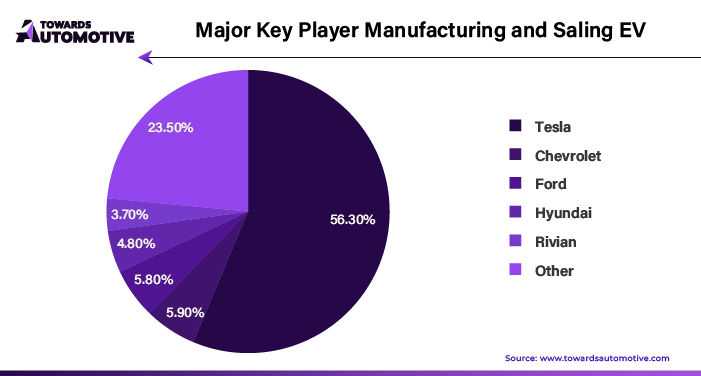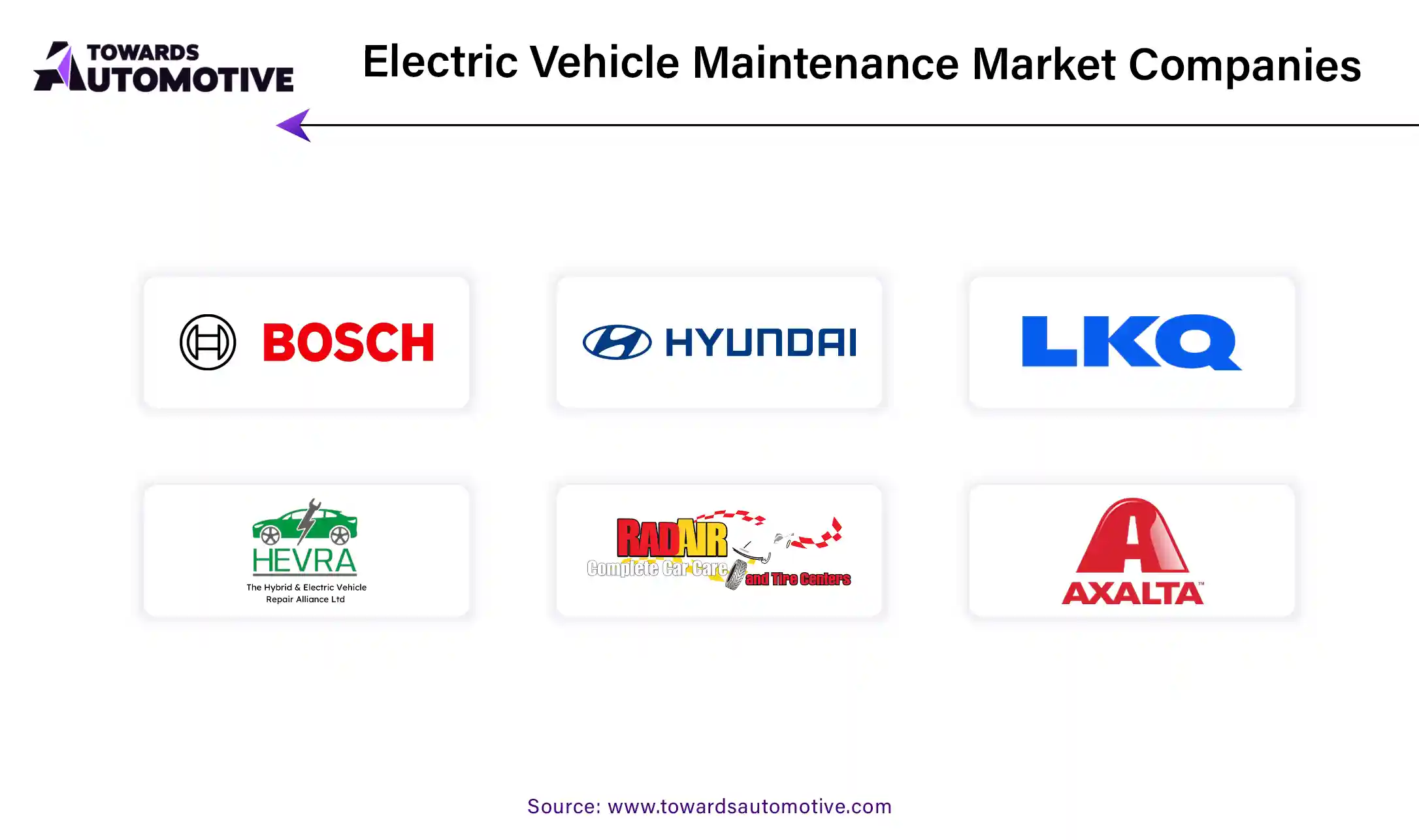October 2025
The electric vehicle maintenance market is expected to increase from USD 24.08 billion in 2025 to USD 84.84 billion by 2034, growing at a CAGR of 15.9% throughout the forecast period from 2025 to 2034.

As the number of electric vehicles (EVs) on the road continues to increase, so does the need for effective maintenance solutions. This surge in EV sales presents a significant opportunity for vendors in the automotive maintenance industry. Government initiatives and growing environmental awareness are driving this adoption, fueling the demand for specialized services.
Electric vehicles, while eco-friendly, present unique maintenance challenges. Studies indicate that EVs experience 79% more maintenance issues compared to traditional gasoline-powered cars. This discrepancy underscores a considerable market opportunity for service providers who can cater to the needs of a burgeoning fleet of electric vehicles.
The shift from gasoline to electric power introduces a new paradigm for vehicle owners. Many consumers are unfamiliar with the specific maintenance requirements of EVs and are therefore more likely to seek out professional services rather than relying on DIY methods or amateur help. Professional service providers are capitalizing on this by showcasing their expertise and specialized capabilities, thereby attracting a growing customer base.
One of the critical components of electric vehicles is their lithium-ion batteries. Despite ongoing efforts to enhance their safety, these batteries can still pose risks, such as the potential for re-ignition even after the heating has ceased. Consequently, there is a heightened demand for maintenance services that can effectively manage and mitigate these risks, ensuring the safe and continuous operation of EV batteries.
However, the high cost of both electric vehicles and their maintenance services can be a barrier for economically disadvantaged consumers. This financial hurdle may limit access to professional services and could impact the overall market growth.
Despite these challenges, the outlook for the electric vehicle maintenance market remains positive. As the industry continues to evolve, the integration of artificial intelligence (AI) promises to play a transformative role, potentially enhancing service efficiency and customer satisfaction. The advent of AI could further drive the market, offering innovative solutions and improving the overall maintenance experience for electric vehicle owners. The automotive market valued at USD 4,070.19 billion in 2023, is experiencing growth and is projected to surpass USD 6,678.28 billion by 2032, with a significant CAGR of over 5.66%.
Artificial Intelligence (AI) is revolutionizing the Electric Vehicle (EV) maintenance market by enhancing efficiency and predictive capabilities. By integrating AI, companies can analyze vast amounts of data from EVs to predict potential issues before they become serious problems. This proactive approach not only minimizes unexpected breakdowns but also extends the lifespan of EV components. AI-powered diagnostic tools streamline the repair process, making it faster and more accurate. These tools use machine learning algorithms to identify faults and recommend precise solutions, reducing human error and improving service quality.
Moreover, AI facilitates real-time monitoring and remote diagnostics, allowing technicians to address issues without requiring immediate physical intervention. This capability is particularly beneficial for managing a fleet of EVs, as it optimizes maintenance schedules and reduces downtime. The efficiency gains and cost savings achieved through AI integration attract more players to the EV maintenance sector, spurring market growth. Overall, AI is set to become a cornerstone of the EV maintenance market, driving advancements and expanding opportunities for service providers.
The supply chain in the electric vehicle (EV) maintenance market operates as a dynamic and interconnected network, crucial for sustaining the growing EV sector. At its core, the supply chain begins with the procurement of specialized components and tools required for EV maintenance. Manufacturers and suppliers work closely to ensure a steady flow of high-quality parts such as batteries, electric drivetrains, and advanced diagnostic equipment.
Logistics plays a pivotal role, involving the efficient transportation of these components from suppliers to maintenance centers. This requires coordination between shipping companies, warehousing facilities, and inventory managers to minimize delays and maintain stock levels. Maintenance service providers, including repair shops and dealerships, rely on a streamlined supply chain to offer timely and effective services to EV owners.
Technological advancements, such as real-time tracking and predictive analytics, enhance supply chain efficiency by forecasting demand and optimizing inventory management. Additionally, partnerships between stakeholders, including OEMs (Original Equipment Manufacturers) and aftermarket suppliers, facilitate information sharing and collaborative problem-solving, ensuring that the supply chain remains resilient and responsive to market needs.
Overall, a well-orchestrated supply chain is vital for supporting the rapid growth and maintenance needs of the EV industry.
The Electric Vehicle (EV) maintenance market is driven by several key components and the active involvement of various companies. Central to this ecosystem are battery management systems, charging infrastructure, and diagnostic tools. Battery management systems ensure optimal performance and longevity of EV batteries. Companies like Tesla and Panasonic are leading in battery technology, continuously innovating to enhance efficiency and reliability.
Charging infrastructure is another crucial component. Companies such as ChargePoint and EVgo are expanding networks of public charging stations, making EV maintenance more accessible. They focus on improving charging speed and accessibility to support the growing number of electric vehicles.
Diagnostic tools and software are essential for identifying and addressing issues in EVs. Firms like Bosch and AVL are at the forefront, developing advanced diagnostic equipment and software that help technicians efficiently service electric vehicles.
Together, these components and companies create a robust ecosystem that supports the maintenance and longevity of electric vehicles, ensuring they remain a viable and efficient option for consumers worldwide.
The electric three-wheeler market is experiencing rapid growth, with nearly 50% of all three-wheelers on the road now being electric. This figure significantly surpasses the adoption rates of electric two-wheelers and four-wheelers. As a result, maintenance providers are seeing an increased demand, given the diverse range of electric three-wheelers—including tricycles, rickshaws, and trucks—that require regular upkeep.
The commercial appeal of electric three-wheelers further drives this demand. Businesses depend on these vehicles to be operational and roadworthy at all times, leading to frequent maintenance requests.
Government initiatives play a crucial role in accelerating the adoption of electric vehicles. To mitigate the environmental impact of traditional oil-powered vehicles, governments are implementing policies that support electric vehicle growth. These policies include tax reductions and levy waivers, which not only make it easier for manufacturers to enter the market but also create favorable conditions for the electric vehicle maintenance sector.
The entry of major vehicle manufacturers into the electric vehicle space is also contributing to industry expansion. Companies such as Suzuki and Hyundai are now investing in electric vehicle technology, signaling a promising future for the sector. As these new electric vehicles hit the market, the demand for maintenance services is set to grow substantially, further boosting the industry.
The key players operating in the market are focused on launching new electrical vehicles, which has risen the demand of the electric vehicle maintenance and is estimated to drive the growth of the electric vehicle maintenance market over the forecast period.
For instance,
As the electric vehicle (EV) market continues to evolve, maintenance trends are reflecting shifts in technology and consumer preferences. This overview highlights the key aspects of maintenance needs for different types of electric vehicles and the components most in need of upkeep.
Battery Electric Vehicles (BEVs) Lead the Charge
Battery Electric Vehicles (BEVs) are increasingly becoming the predominant type of electric vehicle on the roads. In 2024, BEVs are projected to command a substantial 58.5% of the market share within the electric vehicle segment. This significant share underscores the growing consumer preference for BEVs, particularly among those committed to sustainability and environmental impact.
Why BEVs are Outpacing Hybrid Electric Vehicles (HEVs)
BEVs are preferred over Hybrid Electric Vehicles (HEVs) for several reasons. BEVs, which run solely on electricity, align more closely with sustainability goals compared to HEVs that combine internal combustion engines with electric propulsion. While HEVs do use electric components, their maintenance often includes traditional vehicle upkeep, which does not always fall under the purview of electric vehicle maintenance.

Mechanical Components: The Core of Maintenance Needs
Despite the technological advancements in EVs, mechanical components remain crucial and require significant attention. For 2024, mechanical components are anticipated to account for approximately 54.3% of the maintenance market. This is because, even though EVs generally have fewer mechanical parts compared to traditional vehicles, the existing mechanical components still necessitate regular upkeep to ensure optimal performance.
The Need for Ongoing Maintenance
Electric vehicles, including BEVs and HEVs, still possess mechanical parts that are integral to their operation. These components, from suspension systems to steering mechanisms, need diligent maintenance to prevent wear and ensure the smooth functioning of the vehicle. As a result, while the proportion of mechanical components in electric vehicles is less compared to traditional vehicles, their maintenance remains a critical aspect of overall vehicle upkeep.
The electric vehicle (EV) market is experiencing substantial growth globally, driven by various factors such as government initiatives, advancements in infrastructure, and increased consumer awareness. This report provides a detailed analysis of the market’s growth prospects in different countries, highlighting key factors influencing the sector's expansion.
Growth Projections by Country
India:
India is anticipated to lead the global EV market with the highest growth rate, projected at a CAGR of 18.1% from 2024 to 2034. The country's focus on sustainability and the adoption of favourable policies are driving the rapid expansion of the electric vehicle sector.
For instance,
United States:
The U.S. is set to experience robust growth in the EV sector, with a projected CAGR of 17.5%. Significant investments in infrastructure, such as the recent USD 50 million grant announced by the Transportation Department for repairing and replacing EV charging stations, are expected to support the industry's development.
United Kingdom:
The UK is expected to see a CAGR of 17.3% over the next decade. Despite facing challenges like a shortage of EV maintenance specialists, the country's strong commitment to sustainability and increasing consumer demand for electric vehicles are likely to drive growth.
Germany:
Germany is projected to grow at a CAGR of 16.8%. As a leader in automotive innovation and sustainability, Germany’s commitment to expanding EV infrastructure and supporting green technology plays a crucial role in this growth.
China:
China remains a dominant force in the global EV market with a projected CAGR of 16.7%. The country’s large-scale production capabilities, extensive charging network, and government incentives are significant factors contributing to its growth.
South Korea:
South Korea’s EV market is expected to grow at a CAGR of 16.1%. The presence of major automobile manufacturers like Hyundai, which actively promotes EV maintenance through initiatives such as the 'EV Tech Lab,' enhances the country’s growth prospects.
Canada:
Canada is projected to experience a CAGR of 16.0%. The country’s push towards sustainable transport solutions and supportive government policies are pivotal in driving the growth of the electric vehicle sector.
Italy:
Italy is anticipated to grow at a CAGR of 16.2%. The country’s increasing investment in EV infrastructure and growing consumer interest in electric vehicles are key drivers of this growth.
Australia:
Australia’s EV market is expected to grow at a CAGR of 14.5%. While the market is still developing, the government’s efforts to enhance EV infrastructure and promote green transportation are likely to accelerate growth.
Spain:
Spain is projected to see a CAGR of 14.0%. The country’s ongoing developments in EV infrastructure and increasing public awareness about electric vehicles are expected to contribute to its growth.
France:
France is expected to experience a CAGR of 15.5%. With a strong emphasis on reducing carbon emissions and expanding EV infrastructure, France is well-positioned for continued growth in the electric vehicle sector.
Infrastructure Development:
In the United States, significant investments in EV infrastructure, such as the recent USD 50 million grant for EV charging stations, are enhancing the market’s growth potential. Similarly, countries like Germany and China are advancing their EV infrastructure to support market expansion.
Government Initiatives:
Government policies and incentives play a crucial role in fostering market growth. For instance, India's aggressive sustainability targets and the UK’s commitment to environmental sustainability are driving the electric vehicle sector forward.
Automobile Manufacturer Presence:
Countries with prominent car manufacturers, like South Korea, benefit from increased demand for EV maintenance services. Manufacturers like Hyundai are actively engaging in educational initiatives to promote EV maintenance.
Consumer Demand:
Growing consumer awareness and demand for sustainable transport solutions are critical factors influencing market growth. The increasing popularity of electric vehicles in countries such as the UK and France reflects this trend.
The electric vehicle (EV) maintenance market is predominantly shaped by a few leading players, despite the rapid emergence of new entrants. Among the giants in this sector is Robert Bosch GmbH, which leverages its technological edge to maintain a competitive advantage. Bosch’s advanced in-house technologies, including a sophisticated cloud-based EV battery management service, position it well ahead of its competitors.
Another significant player, Hyundai Motor Company, is investing in the training of its maintenance personnel. By equipping them with specialized skills in electric vehicle maintenance, Hyundai is ensuring that its service network is well-prepared to handle the complexities of EV upkeep.
Recent developments in the market highlight the growing focus on EV maintenance. In February 2024, Logistics UK introduced two electric truck maintenance training programs. These programs, developed in partnership with Stephenson, Brooksby, and Melton (SMB) College and Bristol College, aim to address the skills gap in EV maintenance for commercial vehicles.
In March 2023, Earthling Automotive expanded its service offerings by incorporating electric vehicle maintenance into its portfolio. This move targets the San Francisco Bay Area, reflecting a growing demand for specialized EV maintenance services in the region.

Key companies in the industry include Robert Bosch GmbH, Hyundai Motor Company, LKQ Corporation, The Hybrid Shop, Certified Service, HEVRA Europe OU, YCC Service Center, RAD AIR COMPLETE CAR CARE, SK Innovation Co. Ltd., and Axalta Refinish.

By Electric Vehicle Type
By Component Type
By Vehicle Type
By Region
October 2025
October 2025
October 2025
October 2025
We offer automotive expertise for market projections and customizable research, adaptable to diverse strategic approaches.
Contact Us